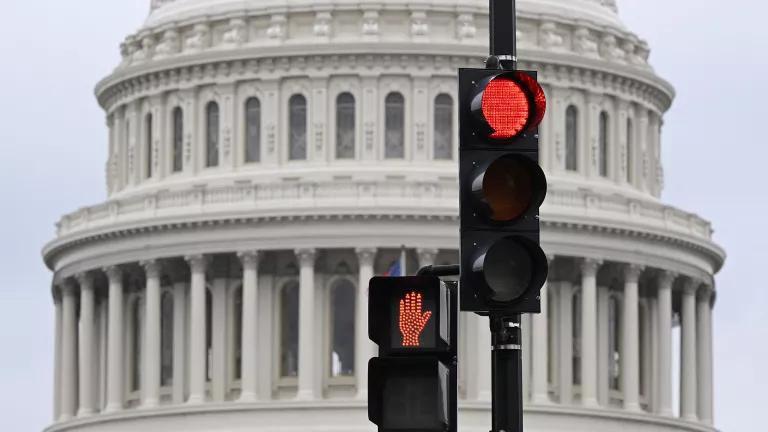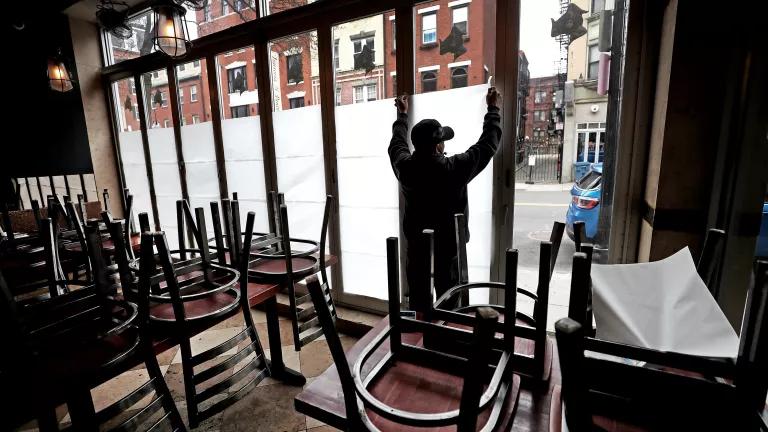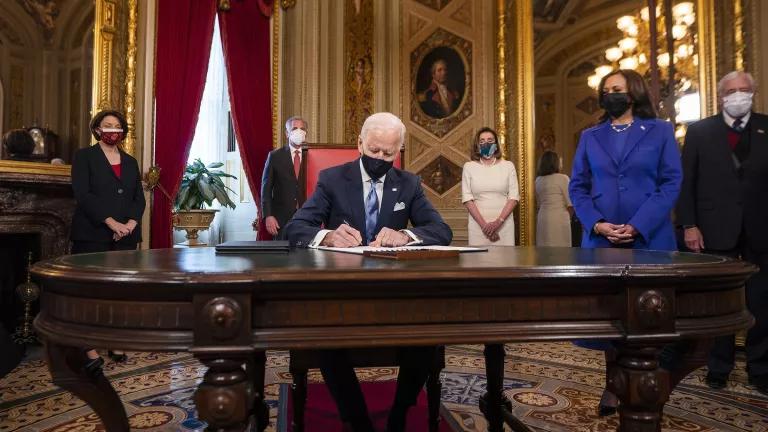Looming Government Shutdown Puts Public Safety and Health at Risk
The House majority must do their job before people are forced to pay the price.

The federal government has begun to inform workers of an impending shutdown that could see millions of federal employees and military personnel sent home or working without pay.
Mandel Ngan/AFP via Getty Images
For the second time in four months, Speaker Kevin McCarthy and the House majority are holding the people of this country hostage to a creaking plank of extremist demands.
Fired by its contempt for functioning government, this radical cohort is, yet again, threatening to shut it down in a cynical ploy to grab headlines at the nation’s expense, inflicting genuine hardship on the daily lives of people across the country, including:
- People who depend on the U.S. Environmental Protection Agency (EPA) to safeguard clean water, clean air, and public health
- People who depend on the National Institutes of Health for the medical research and clinical trials that help us find life-saving cures for cancer, heart disease, Alzheimer's, and other maladies
- People who depend on the U.S. Department of Agriculture to conduct some 7.6 million food safety inspections and related actions each year to protect our families from salmonella, E. coli, and other pathogens than can cause illness and death
This is the serious work of protecting public safety and health, the water we drink, the air we breathe. You can’t do it out of the garage. When House extremists shut down the government, forcing professional public servants off their jobs, all of that and more come to a screeching halt.
The government shutdown in 2013, for example, forced the EPA to halt inspections at some 1,200 sites nationwide, putting communities at increased risk of harm from contaminated drinking water, hazardous waste, and chemical facilities. Under current plans, 90 percent of the agency’s employees would be furloughed in the event of a government shutdown. These are the people we depend on every day to:
- Monitor our rivers, air, and wetlands for industrial pollution
- Make sure our drinking water is safe
- Inspect wastewater treatment plants to make sure we don’t contaminate our rivers
- Clean up hazardous waste under the national Superfund program
- Review toxic chemicals, like pesticides, coming into the country from abroad
- Inspect industrial and commercial sites to make sure work is being done safely and in compliance with our laws
- Issue permits to states, businesses, individuals, and farms under federal laws like the Clean Water Act and the Clean Air Act
- Administer federal grants for water treatment facilities and other critical infrastructure
- Help broker interagency agreements to make sure federal spending and permitting decisions comport with federal laws
The other agencies that oversee this vast national inheritance—the Bureau of Land Management, the Forest Service, the U.S. Fish & Wildlife Service—wouldn’t be able to continue critical restoration projects; fully protect sensitive public lands from vandalism, poaching, illegal camping, or illicit road building; or prevent the unauthorized cutting down of trees.
Indigenous communities would be particularly and disproportionately affected, as key trustee services and obligations that the Interior Department is responsible for would be compromised. And, as referenced above, sacred cultural resources on federal lands would lack adequate protection from vandals or thieves.

U.S. Department of the Interior Secretary Deb Haaland with National Park Service rangers at Hawai’i Volcanoes National Park, June 2023
U.S. Department of the Interior via Flickr
Bureau of Land Management inspectors, whom the public relies on to monitor the oil and gas industry, would be reduced to a skeletal crew, unable to provide adequate oversight of hazardous industrial operations or to respond as usual to blowouts, spills, explosions, or other accidents.
The impacts of a government shutdown would span the full spectrum of our society. Most U.S. Department of Education employees would be furloughed, meaning that grants, loans, and other federal assistance to students, schools, and universities could be disrupted and curtailed. Workplace safety inspections would be curtailed and investigations into unfair labor practices would be suspended. Nearly all of the 1,200 staffers at the National Labor Relations Board would be furloughed, curtailing that agency’s ability to mediate labor disputes. The federal agencies that oversee the vast financial and commodity markets would furlough nearly all of their workers, suspending normal enforcement and regulation and only responding to emergencies.
Likewise, important economic data—such as reports on unemployment, retail sales, and housing starts—would be suspended, denying analysts, investors, and consumers the basic information upon which decision-making depends.
The 2018–2019 shutdown cost the economy some $8 billion in 2019 growth. Now, as policymakers strive to avert a recession while squeezing out inflation, economists say every week that the government is shut down will cost the economy $6 billion and shave 0.2 percent off of GDP growth.
Congress has no more basic job than to pass an annual budget to direct national resources to address the interests and aspirations of the country. That’s the first thing we have a right to expect from our elected officials, if nothing else.
That’s why the Constitution of the United States, drawing on a practice reaching back to the 17th-century British Parliament, endowed Congress with the power of the purse—the sole authority to tax the public and invest in priorities that reflect the will of the people.
Discerning those priorities, and funding them by passing a budget, requires political compromise, the seed corn of a healthy democracy. Instead, the business of the nation is being held hostage, yet again, to a hard-right faction working off the playbook of a sandbox bully: Do what I say—or else.
That’s not how a healthy democracy works. We elect members to Congress to serve as stewards of sound governance. The inability to govern well speaks to flawed leadership and political dysfunction. The inability to govern at all is abject failure. It’s time for the House majority to do its job—if it’s possibly able to do so—before we, the people, are forced to pay the price.




